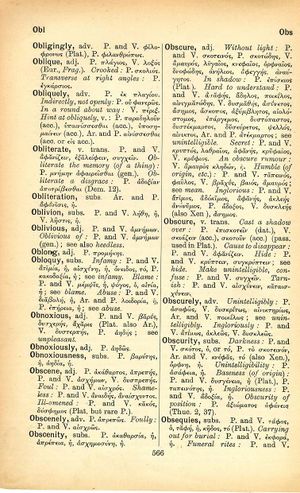obscure: Difference between revisions
ἢ τοὺς πότους ἐρεῖς δῆλον ὅτι καὶ τὰ δεῖπνα καὶ ἐσθῆτα καὶ ἀφροδίσια, καὶ δέδιας μὴ τούτων ἐνδεὴς γενόμενος ἀπόλωμαι. οὐκ ἐννοεῖς δὲ ὅτι τὸ μὴ διψῆν τοῦ πιεῖν πολὺ κάλλιον καὶ τὸ μὴ πεινῆν τοῦ φαγεῖν καὶ τὸ μὴ ῥιγοῦν τοῦ ἀμπεχόνης εὐπορεῖν; → There you'll go, talking of drinking and dining and dressing up and screwing, worrying I'll be lost without all that. Don't you realize how much better it is to have no thirst, than to drink? to have no hunger, than to eat? to not be cold, than to possess a wardrobe of finery? (Lucian, On Mourning 16)
m (Woodhouse1 replacement) |
mNo edit summary |
||
| Line 3: | Line 3: | ||
===adjective=== | ===adjective=== | ||
[[without light]]: [[prose|P.]] and [[verse|V.]] [[σκοτεινός]], [[prose|P.]] [[σκοτώδης]], [[verse|V.]] [[ἀμαυρός]], [[λυγαῖος]], [[κνεφαῖος]], [[ὀρφναῖος]], [[ | [[without light]]: [[prose|P.]] and [[verse|V.]] [[σκοτεινός]], [[prose|P.]] [[σκοτώδης]], [[verse|V.]] [[ἀμαυρός]], [[λυγαῖος]], [[κνεφαῖος]], [[ὀρφναῖος]], [[δνοφώδης]], [[ἀνήλιος]], [[ἀφεγγής]], [[ἀναύγητος]]. | ||
[[in shadow]]: [[prose|P.]] [[ἐπίσκιος]] ([[Plato]]). | [[in shadow]]: [[prose|P.]] [[ἐπίσκιος]] ([[Plato]]). | ||
Revision as of 19:17, 1 June 2020
English > Greek (Woodhouse)
adjective
without light: P. and V. σκοτεινός, P. σκοτώδης, V. ἀμαυρός, λυγαῖος, κνεφαῖος, ὀρφναῖος, δνοφώδης, ἀνήλιος, ἀφεγγής, ἀναύγητος.
in shadow: P. ἐπίσκιος (Plato).
hard to understand: P. and V. ἀσαφής, ἄδηλος, ποικίλος, αἰνιγματώδης, V. δυσμαθής, ἀσύνετος, ἄσημος, ἄσκοπος, ἀξύμβλητος, αἰολόστομος, ἐπάργεμος, δυστόπαστος, δυστέκμαρτος, δυσεύρετος, ψελλός, αἰνικτός, Ar. and P. ἀτέκμαρτος; see unintelligible.
secret: P. and V. κρυπτός, λαθραῖος, ἀφανής, κρυφαῖος, V. κρύφιος.
an obscure rumour: V. ἀμαυρὸς κληδών, ἡ.
humble (of origin, etc.): P. and V. ταπεινός, φαῦλος, V. βραχύς, βαιός, ἀμαυρός; see mean.
inglorious: P. and V. ἄτιμος, ἀδόκιμος, ἀφανής, ἀκλεής, ἀνώνυμος, P. ἄδοξος, V. δυσκλεής (also Xen.), ἄσημος.
verb transitive
cast a shadow over: P. ἐπισκοτεῖν (dat.), V. σκιάζειν (acc.), σκοτοῦν (acc.) (pass. used in Plato).
cause to disappear: P. and V. ἀφανίζω, ἀφανίζειν.
hide: P. and V. κρύπτειν, συγκρύπτειν; see hide.
make unintelligible, confuse: P. and V. συγχεῖν.
tarnish: P. and V. αἰσχύνειν, καταισχύνειν.
Latin > English (Lewis & Short)
obscūrē: adv., v. obscurus.
Latin > French (Gaffiot 2016)
obscūrē,¹¹
1 sans voir clair, sans distinguer, confusément : Cic. d. Non. 474, 28
2 obscurément, secrètement, en cachette, à la dérobée : Cic. Cat. 4, 6 ; Clu. 54 ; Par. 45 || en termes obscurs, indistinctement : Cic. Inv. 1, 30 ; Ac. 1, 7 ; Att. 2, 19, 5 ; obscurius Cic. de Or. 2, 329 ; Quint. 3, 4, 3 || de naissance obscure : Macr. Sat. 7, 3 ; Amm. 29, 1, 5 || -rissime Cic. Verr. 2, 4, 53 ; Gell. 17, 13, 5.
Latin > German (Georges)
obscūrē, Adv. (obscurus), I) dunkel, cernere, Cic. Acad. II. fr. 10 (aus Non. 474, 28). – II) bildl., dunkel, a) = undeutlich, unvernehmlich, unverständlich (Ggstz. plane), disserere, Cic.: obscurius dicere, Cic. u. Quint. – b) = im dunkeln, unvermerkt, insgeheim (Ggstz. aperte, perspicue), Cic.: alqd non obsc. ferre, Cic., od. gerere, Suet., etw. nicht geheimhalten, sich merken lassen. – c) = unbekannt, unberühmt, regnare obscurius, ziemlich ruhmlos, Eutr. – bes. der Herkunft nach, obsc. natus, von dunkler, niedriger Herkunft, Eutr. u. Macr.: obscurissime natus, Eutr. u. Amm.

